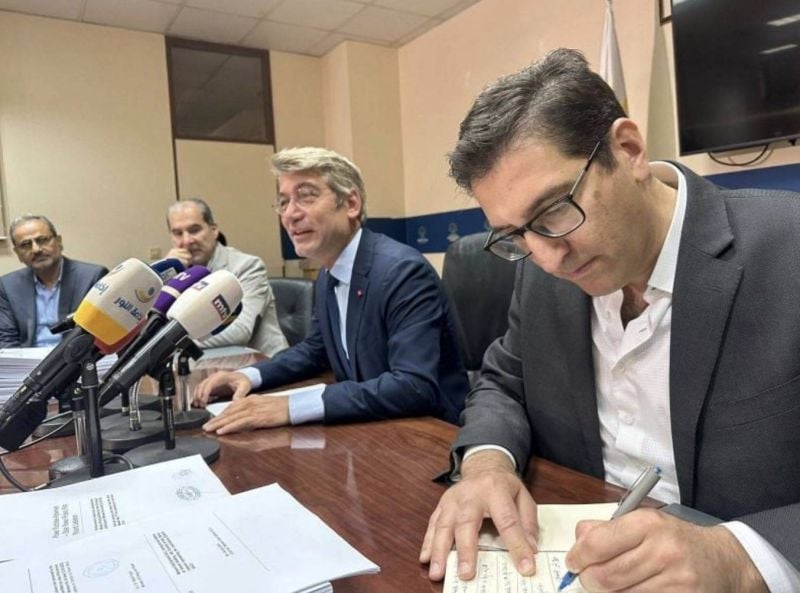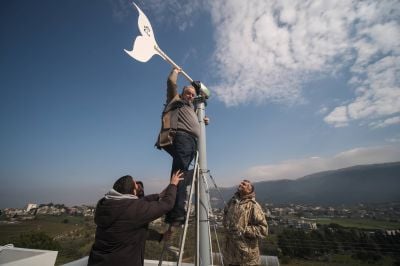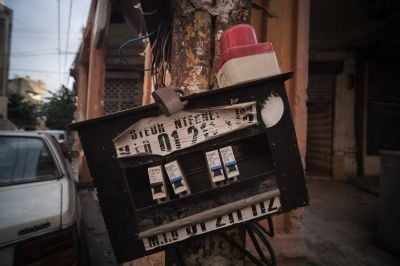
Caretaker Energy Minister Walid Fayad and President of the Lebanese Center for Energy Conservation (LCEC) Pierre Khoury during the press conference Friday. (Via Ministry of Energy and Water website)
After a six-year-long process, caretaker Energy Minister Walid Fayad finally signed contracts on Friday with 11 consortia that promise to generate a total of 165 megawatts of solar energy throughout the country.
The contracts were signed at the Energy Ministry in the presence of Pierre Khoury, president of the board of the Lebanese Center for Energy Conservation (LCEC), a government body that works to develop Lebanon’s renewable energy.
At a press conference Friday, Fayad called the contracts a “historic moment” and a “major achievement” for the country “despite the special circumstances” that Lebanon has been going through since the crisis began in 2019.
Under the contracts, the companies are committed to build the power plants, operate them and sell the energy produced to Electricité du Liban (EDL) at prices that vary by region.
This means 5.7 cents for power produced in the Bekaa Valley and 6.27 cents for the rest of the country. EDL will be able to pay 70 percent of these amounts in fresh dollars and 30 percent in Lebanese lira at Banque du Liban’s Sayrafa rate, as the cabinet decided a year ago, said Khoury.
The power generated by the solar farms will go directly into EDL’s grid and be sold at the same rate as the state power supplier’s existing electricity: 10 cents per kilowatt-hour (kWh) for customers consuming fewer than 100 kWh per month and 27 cents per kWh for those consuming more.
The caretaker minister said that the average cost of producing electricity through EDL’s thermal power plants was 17 cents per kWh.
A project worth nearly 100 million
The 11 photovoltaic power generation licenses issued to each of the consortia (covering a total capacity of 15 MW per farm) was approved nearly a year ago, on May 12, 2022. The operators will pay the construction costs and seek the necessary financing themselves.
“It costs about $600,000 per MW, that is to say a total cost of $99 million for the 165 MW to be generated,” Khoury told L’Orient-Le Jour.
“In accordance with the timetable established by the cabinet last spring, the consortia now have a maximum of one year to find the necessary financing. They can do so from institutions such as the International Finance Corporation (IFC), the private sector arm of the World Bank, the European Investment Bank (EIB), the European Bank for Development and Reconstruction (EBRD) or KFW,” a German state-owned bank, added Khoury.
This means that the financing has not yet been secured.
Once the funding is found — which must also cover the cost of the land, also at the companies’ expense — they will have another year to build and commission the plants.
“If one of the consortia finds the funds tomorrow, it can move directly to the next stage. The fact that one or more of the consortia could not find the funding in time will not impact those who are on schedule,” said Khoury.
He added that the sites where the different photovoltaic panel farms will be developed have already been identified, but that the consortiums will be able to change them if they find others that are more suitable or at a better price.
Dismantling after 25 years
Once the production begins, the consortia will operate the photovoltaic farms for 25 years. After that, they will dismantle them as per the contract, “in compliance with environmental standards,” said Khoury.
“The ministry assumes that the facilities set up today will be obsolete in 25 years and ensures that EDL would not bear the burden of dismantling them. However, there is nothing that prevents the consortia from reusing these facilities on their own behalf, provided that the necessary authorizations are granted,” he added.
These contracts are part of the plan to reform Lebanon’s electricity sector, put forth by Fayad in February 2022. It includes the medium-term construction of 12 solar farms with a capacity of 180 megawatts, spread across several parts of the country, as well as three wind farms to be developed in Akkar with a total capacity of 226 megawatts. However, the project itself was launched in 2017, with a first call for tenders, before its implementation was delayed for various reasons.
In August 2019, former Energy Minister Nada Boustani announced that Lebanon had increased the share of renewable energy, and committed to generate 30 percent of its demand from renewable energy by 2030. Upon taking office in September 2021, Fayad said that this target would be maintained.
The winning consortia (each of which include between two to four companies) include the following, according to LCEC.
- In the Bekaa and Baalbek-Hermel, they consist of ECOSYS-KACO, DAWTEC-LOOOP-STAUNCH and LABWE Solar Farm.
- In Mount Lebanon, the licenses were granted to JOUN PV, SIBLINE Solar Farm and E/ONE.
- In South Lebanon and Nabatieh, the selected companies are SOUTH POWER, RIMAT 154 and GDS-ET-NABATIYEH
- Finally, in North Lebanon and Akkar, KFIFANE-PHOENIX POWER PLANT and ELECT - STC - SOLISTIS
This article was originally published in French in L'Orient-Le Jour. Translation by Joelle El Khoury.

